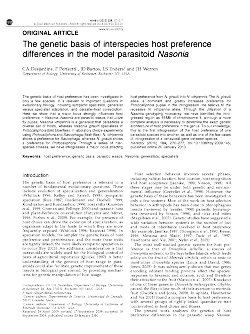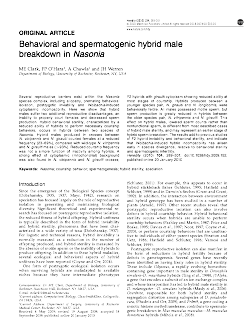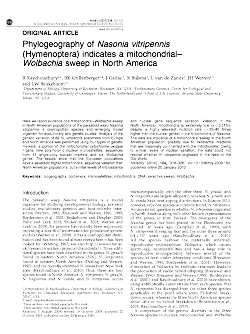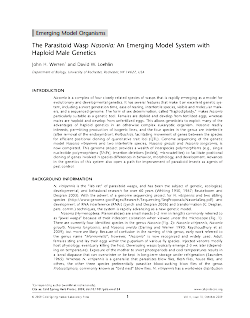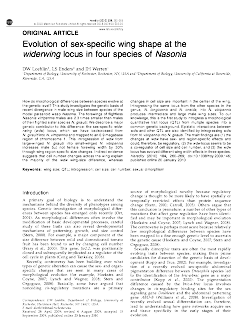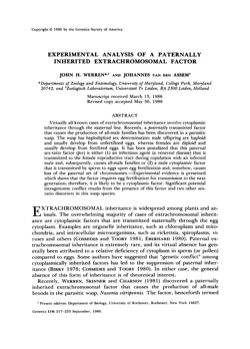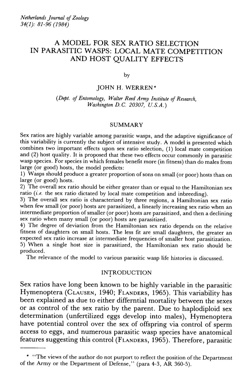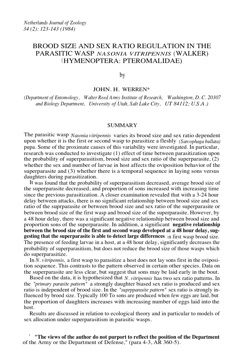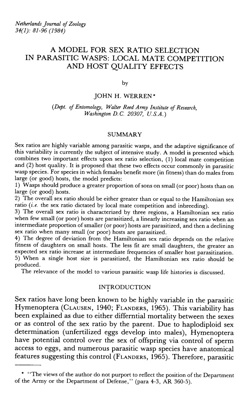1. Werren, J.H. and E.L Charnov. 1978. Facultative sex ratios and population dynamics. Nature 272:349-350.
2. Werren, J.H., M.R. Gross and R. Shine. 1980. Paternity and the evolution of male parental care. J. Theor. Biol. 82:619-631.
3. Werren, J.H. 1980. Sex ratio adaptations to local mate competition in a parasitic wasp. Science 208:1157-1160.
4. Skinner, S.W. and J.H. Werren. 1980. The genetics of sex determination in Nasonia vitripennis (Hymenoptera, Pteromalidae). Genetics 94: s98.
5. Werren, J.H., S.W. Skinner and E.L. Charnov. 1981. Paternal inheritance of a daughterless sex ratio factor. Nature 293:467-468.
6. Werren, J.H. and R. Pulliam. 1981. An intergenerational transmission model for the cultural evolution of helping behavior. Human Ecology 9(4):465-483.
7. Werren, J.H. 1983. Sex ratio evolution under local mate competition in a parasitic wasp. Evolution 37(1):116-124.
8. Werren, J.H. and P.D. Taylor. 1984. The effects of population recruitment upon sex ratio selection. American Naturalist 124(1):143-148.
9. Werren, J.H. 1984. A model for sex ratio selection in parasitic wasps: Local mate competition and host quality effects. Neth. J. Zool. 34(1):81-96.
10. Werren, J.H. 1984. Brood size and sex ratio regulation in the parasitic wasp. Nasonia vitripennis. Neth. J. Zool. 34(2):151-174.
11. Huger, A., S.W. Skinner and J.H. Werren. 1985. Bacterial infections associated with the son-killer trait in the parasitoid wasp Nasonia (=Mormoniella) vitripennis. J. Invert. Path. 46:272-280.
12. Werren, J.H., S.K. Skinner and A. Huger. 1986. Male-killing bacteria in a parasitic wasp. Science 231:990-992.
13. Werren, J.H. and J. van den Assem. 1986. Experimental analysis of a paternally inherited extrachromosomal factor.Genetics 114:217-233.
14. Werren, J.H. 1987. Labile sex ratios in wasps and bees. Bioscience 37:498-506.
15. Werren, J.H. 1987. The coevolution of autosomal and cytoplasmic sex ratio factors. J. Theor. Biol. 124:317-334.
16. Werren, J.H., U. Nur and D. Eickbush. 1987. An extrachromosomal factor which causes loss of paternal chromosomes. Nature 327:75-76.
17. Raupp, M., J.H. Werren and C. Sadoff.1988.Effects of short term phenological changes in leaf suitability on the survivorship, growth, and development of gypsy moth larvae. Env. Entom. 17:316-319.
18. Nur, U., J.H. Werren, D. Eickbush, W. Burke and T. Eickbush, 1988.A "selfish" B chromosome that enhances its transmission by eliminating the paternal chromosomes.Science 240:512-514.
19. Werren, J.H. 1988.Manipulating mothers.Natural History 97: 68-69.
20. Werren, J.H. and C.J. Peterson, 1988. Osprey hunting on ground for small mammals. Wilson Bull. 100(3):88.
21. Werren, J.H., U. Nur., and C.-I. Wu. 1988. Selfish genetic elements. Trends in Ecol. & Evolution 3:297-302.
22. Werren, J.H. and P. Simbolotti. 1989. Combined effects of host size and local mate competition on sex ratio evolution in Lariophagus distinguendus. Evolutionary Ecology 3:203-213.
23. Darling, D.C. and J.H. Werren. 1990. Biosystematics of two new species of Nasonia Hymenoptera: Pteromalidae) reared from birds' nests in North America. Annals Ent. Soc. Amer. 83(3):352-370.
24. Breeuwer, H. and J. H. Werren. 1990. Microorganisms associated with chromosome destruction and reproductive isolation between two insect species. Nature 346: 558-560.
25. Werren, J.H. 1991. The PSR (paternal sex ratio) chromosome. Amer. Natur. 137:392-402.
26. Gherna, R., J. H. Werren, W. Weisburg, R. Cote, C. R. Woese, L. Mandelco and R. Brenner. 1991. Arsenophonus nasoniae, genus novel, species novel, causative agent of Sonkiller trait in the parasitic wasp, Nasonia vitripennis. Inter. J. Bact. Syst. 41:563-565.
27. Werren, J.H., M. Raupp, T. O'Dell and C. Sadoff. 1992. Host plants utilized by Gypsy Moths affect survival and development of the parasitoid Cotesia melanoscela. Env. Entom. 21:173-177.
28. Bull, J.J., I.J. Molineux and J.H. Werren. 1992. Selfish Genes. Science 256:65.
29. Stouthamer, R., R. F. Luck and J. H. Werren. 1992. Genetics of sex determination and improvement of biological control using parasitoids. Envir. Entomol. 21(3):427-435.
30. Breeuwer, J.A.J., R. Stouthamer, S.M. Burns, D.A. Pelletier, W.G. Weisburg and J.H. Werren. 1992. Phylogeny of cytoplasmic incompatibility microorganisms in the parasitoid wasp genus Nasonia (Hymenoptera: Pteromalidae) based on 16S ribosomal DNA sequences. Insect Mol. Biol. 1(1):25-36.
31. Eickbush, D., T. Eickbush and J.H. Werren. 1992. Molecular characterization of repetitive DNA sequences from a B chromosome. Chromosoma 101:575-583.
32. Beukeboom, L. and J.H. Werren. 1992. Population genetics of a parasitic chromosome: Experimental analysis of PSR in subdivided populations. Evolution 46(5):1257-1268.
33. Stouthamer, R., J.A.J. Breeuwer, R.F. Luck and J.H. Werren. 1993. Molecular identification of microorganisms associated parthenogenesis. Nature 361:66-68.
34. Beukeboom, L.W., K.M. Reed and J.H. Werren. 1993. Effects of deletions on mitotic stability of the Paternal Sex Ratio (PSR) chromosome from Nasonia. Chromosoma 102:20-26.
35. Werren, J.H. and L. Beukeboom. 1993. Population genetics of a parasitic chromosome: Theoretical analysis of PSR in subdivided populations. Amer. Natur. 142:224-241.
36. Stouthamer, R. and J.H. Werren. 1993. Microbes associated with parthenogenesis in wasps of the species Trichogramma. J. Invert. Pathol. 61:6-9.
37. Beukeboom, L.B. and J.H. Werren. 1993. Transmission and expression of the parasitic Paternal Sex Ratio (PSR) chromosome. Heredity 70:437-443.
38. Hunter, M. S., U. Nur and J. H. Werren. 1993. Origin of males by genome loss in an autoparasitoid wasp. Heredity 70:162-171.
39. Beukeboom, L. and J.H. Werren. 1993. Deletion analysis of a parasitic B Chromosome - Paternal Sex Ratio (PSR).Genetics 133:637-648.
40. Breeuwer, J.A.J. and J.H. Werren. 1993. The effect of genotype on cytoplasmic incompatibility between two species of Nasonia. Heredity 70:428-436.
41. Werren, J.H. 1993. The evolution of inbreeding in haplodiploid organisms. In, The Natural History of Inbreeding and Outbreeding: Theoretical and Empirical Perspectives. ed. N. Thornhill. Univ. Chicago Press.
42. Breeuwer, J.A.J. and J.H. Werren. 1993. Cytoplasmic incompatibility and bacterial density in Nasonia vitripennis.Genetics 135:565-574.
43. Campbell, B.C., J.D. Steffen-Campbell and J.H. Werren 1993. Phylogeny of the Nasonia species complex (Hymenoptera: Pteromalidae) inferred from an rDNA internal transcribed spacer (ITS2). Insect Molec. Biol. 2:255-237.
44. Assem, J. van den and J.H. Werren. 1994. A comparison of the courtship and mating behavior of three species of Nasonia (Hym., Pteromalidae). J. Insect Behav. 7:53-66.
45. Reed, K.M., L.W. Beukeboom, D. Eickbush and J.H. Werren. 1994. Junctions between repetitive DNA's on the Paternal Sex Ratio (PSR) chromosome: Association of palindromes with recombination. J. Mol. Evol. 38:352-362.
46. Werren, J.H., G.D.D. Hurst, W.Zhang, J.A.J. Breeuwer, R. Stouthamer and M.E.N. Majerus. 1994. Rickettsial relative associated with male-killing in the ladybird beetle (Adalia bipunctata). J. Bacteriol. 176:388-394.
47. Werren, J.H. 1994. Genetic invasion of the insect body snatchers. Natural History 103(6):36-38.
48. Reed, K.M. and J.H. Werren. 1995. Induction of paternal genome loss by the Paternal Sex Ratio Chromosome and cytoplasmic incompatibility bacteria (Wolbachia): A comparative study of early embryonic events. Mol. Repro. & Devel. 40:408-418.
49. Breeuwer, J.A.J. and J.H. Werren. 1995. Hybrid breakdown between two haplodiploid species: The role of nuclear and cytoplasmic genes. Evolution 49:705-717.
50. Werren , J.H. and J. Jaenike 1995. Wolbachia and cytoplasmic incompatibility in mycophagous Drosophila and their relatives. Heredity 75:320-326.
51. Werren, J.H., W. Zhang, and L.R. Guo. 1995. Evolution and Phylogeny of Wolbachia Bacteria: Reproductive Parasites of Arthropods.Proc. Royal Soc. London B 261:55-71.
52. Werren, J.H. and H.C. Godfray. 1995. Sex Ratio. Ency of Env Biol. 3:317-323.
53. Werren, J.H., D. Windsor, and Li Rong Guo. 1995. Distribution of Wolbachia among neotropical arthropods.Proc. Royal Soc. London B. 262:197-204.
54. Godfray, H.C.J. & Werren, J.H. 1996. Recent developments in sex ratio studies. Trends in Ecology and Evolution 11:59-63.
55. Balas, M., M. Lee and J.H. Werren. 1996. Geographical distribution and fitness effects of the sonkiller bacterium in Nasonia. Evol. Ecol. 10:593-607.
56. Godfray, H.C.J. & Werren, J.H. 1996. Liver physiology and sex ratio biology - Reply Trends in Ecology and Evolution 11:384-385.
57. Perrot-Minnot, M.-J., L.R. Guo and J.H. Werren. 1996. Single and double infections of Wolbachia in the parasitic wasp Nasonia vitripennis: Effects on compatibility. Genetics 143:961 - 972.
58. Werren, J.H. 1997. Biology of Wolbachia. Ann. Rev. Entom. 42:587 - 609.
59. McAllister, B.F. and J.H. Werren 1997. Phylogenetic analysis of a retrotransposon with implications for strong evolutionary constraints on reverse transcriptase. Mol. Biol. & Evol. 14:69-80.
60. Werren, J.H. and S. O'Neill 1997. The evolution of heritable symbionts. In Influential Passengers:inherited microorganisms and arthropod reproduction. [S. O'Neill, A. Hoffman and J.H. Werren, eds] Oxford University Press
61. McAllister, B.F. and J.H. Werren. 1997. Hybrid origin of a B chromosome (PSR) in the parasitic wasp Nasonia vitripennis. Chromosoma 106:243-253.
62. Werren, J.H., 1997. Wolbachia run amok. Proc. Natl. Acad. Sci. 94:11154-11155.
63. Werren, J.H. 1998. Wolbachia and speciation. in Endless Forms: Species and Speciation, (D. Howard and S Berlocher, eds). pp. 245-260. Oxford University Press.
64. Bordenstein, S.R. and J.H. Werren 1998. Effects of A and B Wolbachia and host genotype on interspecies cytoplasmic incompatibility between two Nasonia species. Genetics 148:1833-1844.
65. Werren, J.H. and L. Beukeboom. 1998. Sex Determination, Sex Ratios and Genetic Conflict. Ann. Rev. Ecol. & Systematics 29:233-261.
66. West, S.A., J.M Cook, J.H. Werren and H.C.J. Godfray. 1998. Wolbachia in two host-parasitoid communities.Molecular Ecology 7:1457-1465.
67. Hariri, A.R., J.H. Werren and G.S. Wilkinson. 1998. Distribution and fitness effects of Wolbachia in stalk-eyed flies (Diptera: Diopsidae). Heredity 81:254-260.
68. Perrot-Minnot, M.J. and J.H. Werren. 1999. The dynamics of Wolbachia infection in the parasitic wasp Nasonia vitripennis: selection on incompatibility and bacterial inheritance patterns. J. Evol. Biol. 12:272-282.
69. McAllister, B.F. and J.H. Werren 1999. Evolution of tandemly repeated sequences: What happens at the end of an array?J. Mol. Evol. 48:469-481.
70. Drapeau, M. and J.H. Werren. 1999. Differences in mating behavior and sex ratio between three sibling species of Nasonia. Evolutionary Ecology Research 1:223-234.
71. Werren, J.H. and M.J. Perrot-Minnot. 1999. An antennapedia mutant in Nasonia vitripennis. J. Heredity 90:319-320.
72. Hurst, G., F.M. Jiggins, J.H. Graf von der Schulenburg, D. Bertrand, J.H. Werren, S. West, I.I Goriacheva, I.A. Zakharov, R. Stouthamer, and M.E.N. Majerus. 1999. Male killing Wolbachia in two species of insects. Proc. R. Soc. London B 266:735-740.
73. Weston, R., I. Qureshi and J.H. Werren. 1999. Genetics of a morphological difference between two insect species. Journal of Evolutionary Biology 12:586-595.
74. Gadau, J., R. Page and J.H. Werren. 1999. Mapping of hybrid incompatibility loci in Nasonia. Genetics 153:1731-1741.
75. Slatko, B., S.L. O'Neill, A.L. Scott, J.H. Werren, and M.L. Blaxter. 1999. The Wolbachia Genome Consortium. Microbial and Comparative Genomics 1999 4: 161-165
76. Bordenstein, S.R. and J.H. Werren. 2000. Do Wolbachia have positive fitness effects in Nasonia? Heredity 84:54-62.
77. Werren, J.H. and M. Hatcher. 2000. Maternal - zygotic gene conflict over sex determination: Effects of inbreeding. Genetics 155: 1469-1479.
78. Bordenstein, S.R., M. Drapeau and J.H. Werren. 2000. Intraspecific variation in interspecific premating isolation between two Nasonia species. Evolution 54: 567|573.
79. Gadau, J., R.E. Page, J.H. Werren and P. Schmid-Hempel. 2000. Genome Organization and Social Evolution in Hymenoptera. Naturwissenshaften 87: 87-89 .
80. Werren, J.H. and D.W. Windsor. 2000. Wolbachia infection frequencies in insects: evidence of a global equilibrium? Proc. Roy. Soc. Lond. B. 267: 1277 -- 1285.
81. Shoemaker, D.D., K.G. Ross, L. Keller, E.L. Vargo and J.H. Werren. 2000. Wolbachia infections in native and introduced populations of fire ants (Solenopsis spp.). Insect Mol. Biol 9:661-674.
82. Beukeboom, L.W. and J.H. Werren. 2000. The Paternal Sex Ratio (PSR) chromosome in natural populations of Nasonia (Hymenoptera: Chalcidoidea). Journal Evolutionary Biology 13:967-975.
83. Bordenstein, S.R., F.P. O’Hara and J.H. Werren. 2001. Wolbachia-induced bidirectional incompatibility precedes other hybrid incompatibilities in Nasonia. Nature 409:707-710.
84. Werren, J.H. and J. Bartos. 2001. Recombination in Wolbachia. Current Biology 11: 431-435.
85. Hurst, G.D.D. and J.H. Werren. 2001. The role of selfish gene tic elements in eukaryotic evolution. Nature Reviews 2:597-606.
86. Perfectti, F. and J.H. Werren. 2001. The interspecific origin of B chromosomes: experimental evidence. Evolution 55: 1069-1073.
87. Lawson, E.T., T.A. Mousseau, R. Klaper, M.D. Hunter, and J.H. Werren. 2001. Rickettsia associated with male-killing in a buprestid beetle. Heredity 86:497-505.
88. Perrot-Minnot, M. and J.H. Werren. 2001. Meiotic and mitotic stability of an EMS-produced centric fragment in the haplodiploid wasp Nasonia vitripennis. Heredity 87: 8-16.
89. Werren, J.H. 2001. Aresenophonus. Bergey's Manual of Systematic Bacteriology (Vol. 2), G.M. Garrity (ed), Springer-Verlag, New York.
90. Gadau, J., R.E. Page, and J.H. Werren 2002. The genetic basis of interspecific differences in wing size in Nasonia | Major genes and epistasis. Genetics 161 (2): 673-684.
91. Telschow, A., P. Hammerstein and J.H. Werren. 2002. The Effect of Wolbachia on Genetic Divergence between Populations: Models With Two Way Migration. American Naturalist 160: S54-S66.
92. Werren, J.H., M.J. Hatcher, and H.C.J. Godfray. 2002. Maternal-Offspring Conflict Leads to the Evolution of Dominant Zygotic Sex Determination. Heredity 88:102-111.
93. Telschow, A., P. Hammerstein and J.H. Werren. 2002. The effect of Wolbachia on genetic divergence between populations: Mainland-Island model. Integr. Comp. Biol. (2): 340-351.
94. Werren, J.H. and R. Stouthamer. 2002. PSR (Paternal Sex Ratio) chromosomes: The ultimate selfish genetic elements. Genetica 117 (1): 85-101.
95. Shoemaker, D.D., E.A. Herre, D. Molbo, C. Machado, J.H. Werren and R. Harrison.2002. Distribution of Wolbachia in New World and Old Word fig wasp communities. Proc. Royal Soc. London B 269: 2257-2267.
96. Casiraghi M., McCall J.W., Simoncini L., Kramer L.H., Sacchi L., Genchi C., Werren J.H. , Bandi C. 2002. Tetracycline treatment and sex-ratio distortion: a role for Wolbachia in the moulting of filarial nematodes? Int. J. Parasit. 32 (12): 1457-1468.
97. Gottlieb Y, E. Zchori-Fein, J. H. Werren, and T. Karr. 2002. Diploidy restoration in Wolbachia-infected Muscidifurax uniraptor. (Hymenoptera: Pteromalidae). J. invert. Pathol. 81:166-174.
98. Werren, J.H. 2003. Invasion of the Gender Benders. Natural History 112:58-63.
99. Baldo, L., J.D. Bartos, J. H. Werren, C. Bazzocchi, M. Casiraghi, and S. Panelli. 2003. Different rates of nucleotide substitutions in Wolbachia from arthropods and nematodes: arms race or host range? Parasitologia 44: 179-187.
100. Baudry, E., K. Emerson, T. Whitworth and J.H. Werren. 2003. Wolbachia and genetic variability in the birdnest blowfly Protocalliphora sialia. Molecular Ecology 12:1843-1854.
101. Bordenstein, S.R., J.J. Uy and J.H. Werren. 2003. Host genotype determines Wolbachia cytoplasmic incompatibility type in Nasonia. Genetics 164:223-233.
102. M. Lachmann, N.W. Blackstone, D. Haig, A. Kowald, R.E. Michod, E. Szathma´ry, J.H. Werren, and L. Wolpert. 2003. Cooperation and conflict in the evolution of genomes, cells, and multicellular organisms. In Genetic and Cultural Evolution of Cooperation. Dahlem Conference Publications, Berlin GE.
103. Bordenstein, S.R., D.H.A. Fitch and J.H. Werren. 2003. Absence of Wolbachia in Nonfilariid Nematodes. J. Nematol. 35(3):266-270
104. McAllister, B.F., L.W. Beukeboom and J.H. Werren. 2004. Site-specific mapping of the paternal-sex-ratio (PSR) chromosome. Heredity 92 (1): 5-13.
105. Keller, G.P., D.M. Windsor, J. Saucedo, J.H. Werren. Reproductive effects and geographical distribution of two Wolbachia strains infecting the Neotropical beetle, Chelymorpha alternans (Chrysomelidae, Cassidinae) Molecular Ecology 13:2405 - 2420.
106. Werren, J.H. 2004. Arsenophonus. Bergey's Manual of Systematic Bacteriology (Vol. 2), G.M. Garrity (ed), Springer-Verlag, New York.
107. Velthuis, B.J., W. Yang, T. van Opijnen and J.H. Werren. 2004. Intra-specific variation in sexual isolation: Genetics of female mate discrimination in Nasonia longicornis (Darling) (Hymenoptera, Pteromalidae). Animal Behavior (in press).
108. Werren, J.H. 2005. Heritable microorganisms and reproductive parasitism. In. Microbial Evolution: Concepts and Controversies. J. Sapp (ed.) Oxford University Press (New York).
109. Werren, J.H., J. Gadau, L. Beukeboom, C. Desplan, J. Lynch, R. Rivers, S. Richards, L. van de Zande 2005. Proposal to sequence the Nasonia genome.
110. Baldo, L., N. Lo, and J.H. Werren. 2005. The Mosaic Nature of the Wolbachia Surface Protein (wsp). J. Bacteriology 187:5406-5418.
111. Telschow, A., J.H. P. Hammerstein, and J.H. Werren. 2005. Wolbachia, reinforcement and speciation. Evolution 59 (8): 1607-1619.
112. Telschow, A., Yamamura, N. and J.H. Werren. 2005. Bidirectional cytoplasmic incompatibility and the stable coexistence of two Wolbachia strains in parapatric host populations. J. theor. Biol. 235 (2): 265-274.
113. Opijnen, T., E. Baudry, J. Bartos, L. Baldo, and J.H. Werren. 2005. Genetic variability in the three genomes of Nasonia: Nuclear, mitochondrial and Wolbachia. Insect Molecular Biology 14 (6): 653-663.
114. Casiraghi M., S.R. Bordenstein , L. Baldo, N. Lo N, T. Beninati, J.J. Wernegreen., J.H. Werren, and C. Bandi. 2005. Phylogeny of Wolbachia based on gltA, groEL and ftsZ gene sequences: Clustering of arthropod and nematode symbionts in the F supergroup and evidence for further diversity in the Wolbachia tree. Microbiology-SGM 151: 4015-4022.
115. Koukou, K. H. Pavlikak, G. Kilias, J.H. Werren, K. Bourtzis and S. Alahiotis. 2006. Influence of Antibiotic Treatment and Wolbachia Curing On Sexual Isolation Among Drosophila melanogaster Cage Populations. Evolution 60: 87-96.
116. Baldo, L., S.R. Bordenstein, , J. Wernegreen, and J.H. Werren. 2006. Widespread recombination throughout Wolbachia genomes. Molecular Biology and Evolution 23 (2): 437-449.
117. Baudry, E., M. Desmadril and J. H. Werren. 2006. Rapid adaptive evolution of the signal transduction gene Pten in an insect lineage. J. Mol. Evol. 62: 1432-1432.
118. Uyen Tram, K. Fredrick, J.H. Werren, and W. Sullivan. 2006. Paternal Chromosome segregation during the first mitotic division determines cytoplasmic incompatibility phenotype. J. Cell Science 119(17): 3655-3663.
119. Paraskevopoulos, C., S.R. Bordenstein, J. Wernegreen, J.H. Werren and K. Bourtzis. Towards a Wolbachia Multi Locus Strain Typing system: Discrimination of Wolbachia strains present in Drosophila species. Current Microbiology 53:388-395.
120. Savard, J, D. Tautz, Stephen Richards, George M. Weinstock, Richard A. Gibbs, J.H. Werren, H. Tettelin, D. Leaf, and M.J. Lercher. 2005. Phylogenomic analysis reveals bees and wasps (Hymenoptera) at the base of the radiation of holometabolous insects. Genome Research 16:1334-1338.
121. Baldo, L., J.C. Dunning Hotopp, S.R. Bordenstein, S. Biber, K. Jollie, C. Hayashi, H. Tettelin, M. Maiden, and J.H. Werren. 2006. A Multilocus Sequence Typing System for the endosymbiont Wolbachia. Applied and Experimental Microbiology 72:7098-7110.
122. Nault, B.A., A.M. Shelton, J.L.Gangloff-Kaufmann, M.E. Clark, J.H. Werren, J.C. Cabrera-Larosa, and G.G. Kennedy. 2006. Reproductive modes of Onion Thrips (Thysanoptera: Thripidae) populations from New York onion fields. Environmental Entomology 35:1264-1271.
123. Beukeboom, L.W., A. Kamping, M. Louter, L.P. Pijnacker, V. Katju, P.M. Ferre, and J.H. Werren. 2007. Haploid females in the parasitic wasp Nasonia vitripennis. Science 315:206.
124. Gadau, J., J. H. Werren, O. Nihuis and L. Beukeboom. 2007. The Jewel Wasp. "Genome Mapping and Genomics in Animals Volume: IV: Insects (C. Kole and W. Hunter eds., Springer, Berlin). (In Press).
125. Kamping, A., V. Katju, L.W. Beukeboom and J.H. Werren. 2007. Inheritance of gynandromorphisms in the parasitic wasp Nasonia vitripennis. Genetics 175 (3):1321-1333.
126. Ioannidis, P., J.C. Dunning-Hotopp, P. Sapountzis, S. Siozios, G. Tsiamis, S.R. Bordenstein, L. Baldo, J.H. Werren and K. Bourtzis. 2007. New Criteria for selecting the origin of DNA replication in Wolbachia and closely related bacteria. BMC Genomics 8: Art. No. 182.
127. Lo, N., C. Paraskevopoulos, K. Bourtzis, S. L. OfNeill, J. H. Werren, S. Bordenstein and C. Bandi. 2007. Phylogenetic and taxonomic status of the intracellular bacterium Wolbachia pipientis. Int. J. Syst. Evol. Micro 57:654-657.
128. Baldo, L, N. Ayoub and J. H Werren. 2007. Revisiting Wolbachia Supergroup Typing Based on WSP: Spurious Lineages and Discordance with MLST. Current Microbiology 55:81-87.
129. Bordenstein, S.R. and J. H. Werren. 2007. Bidirectional Incompatibility among divergent Wolbachia and incompatibility level differences among closely related Wolbachia in Nasonia. Heredity 99:278-287.
130. Telschow, A., M. Flor, K. Kobayashi, P. Hammerstein, and J.H. Werren. 2007. Wolbachia induced Unidirectional CI as a Promotor of Speciation: Mainland-Island Model. PlosOne 8:1-10.
131. Baldo, L., A. Corthals, L. Perondini and J. H. Werren. 2007. Wolbachia in South African scorpions cluster with supergroup F. Current Microbiology 55:81-87.
132. Niehuis, O., A.K. Judson, J.H. Werren, W. Hunter, S.E. Dowd, B. Grillenberger, L.W. Beukeboom, and J. Gadau. 2007. Species diagnostic EST-derived SNP and STS markers for the wasp genus Nasonia Ashead, 1904 (Hymenoptera; Pteromalidae). J. Econ. Entom. 100 (4): 1033-1036.
133. Dunning Hotopp, J., M.E. Clark, P. Fischer, J. Foster, D. Oliveira, M.C.M. Torres, J. Giebel, S. Wang, R. Nene, J. Shepard, N. Ishmael, N. Kumar, E. Ghedin, J. Tomkins, S. Richards, D. Spiro, B. Slatko, H. Tettelin, and J.H. Werren. 2007. Widespread Lateral Gene Transfers from Intracellular Bacteria to Multicellular Eukaryotes. Science 317 (5845): 1753-1756).
134. Baldo LB, N.A. Ayoub, J.R. Russel, J.S. Stahlhut, C.H. Hayashi. and J.H. Werren. 2007. Insights into the routes of Wolbachia invasion: strain shuffling across populations and species of the spider genus Agelenopsis revealed by strain and mitochondria diversity. Molecular Ecology 17:557-569.
135. Hilgenbocker, K. A. Telschow, P. Hammerstein, P. Schlattmann, A. Telschow, and J.H. Werren. 2007. How many species are infected with Wolbachia?: A statistical analysis of current data. FEMS Microbiology (In Press). 136. Clark, M. E., C. Bailey, P. Ferree, S. England, D. Windsor, and J. H. Werren. 2008. Wollbachia modification of sperm does not require residence within developing spermatids or spermatocytes. Heredity 101:420-428.
136. Clark, M. E., C. Bailey, P. Ferree, S. England, D. Windsor, and J. H. Werren. 2008. Wollbachia modification of sperm does not require residence within developing spermatids or spermatocytes. Heredity 101:420-428.
137. Werren, J.H., L. Baldo, and M.E. Clark. 2008 Wolbachia: Master Manipulators of Invertebrate Biology. Nature Reviews Microbiology 6:741-751.
138. Ferree, P.M., A. Avery, J. Azpurua, T. Wilkes and J.H. Werren 2008. Bacterium blocks centrosome formation to kill males in Nasonia vitripennis. Current Biology 18:1409-1414.
139. Deodoro C. S. G. Oliveira, R. Raychoudhury, D.V. Lavrov, & J.H. Werren 2008. Rapidly evolving mitochondrial genome and directional selection in mitochondrial genes in the parasitic wasp Nasonia (Hymenoptera: Pteromalidae). Molecular Biology & Evolution 25:2167-2180.
140. Raychoudhury, R., L. Baldo, D.C.S.G. Oliveira, and J.H. Werren. 2008. Modes of Acquisition of Wolbachia in Nasonia: Horizontal Transfer, Hybrid Introgression and Co-divergence. Evolution 63:165-183.
141. Russell J.A., B. Goldman-Huertas, C.S. Moreau, L. Baldo, J.K. Stahlhut, J.H. Werren, N.E. Pierce. 2009. Specialization and geographic isolaton among Wolbachia symbionts from ants and Lycaenid butterflies. Evolution 63:624-640.
142. Bordenstein, S.R., C. Paraskevopoulos, J.C. Dunning Hotopp, P. Sapountzis, N. Lo, C. Bandi, H. Tettelin, J.H. Werren and K. Bourtzis. 2009. Parasitism and mutualism in Wolbachia: What the phylogenomic trees can and can not say. Molecular Biology and Evolution 26(1):231-241.
143. Koehncke, A., A. Telschow, J. H. Werren, and P. Hammerstein. 2009. Life and death of an influential passenger: Wolbachia and the evolution of CI-modifiers by their hosts. PlosOne 4 (2):e4425.
144. Oliveira, D.C.S.G, J.H. Werren, E. Verhulst, J.D. Giebel, A. Kamping, L.W. Beukeboom and L. van de Zande. 2009. Identification and Characterization of the Doublesex gene of Nasonia. Insect Molecular Biology 25(10): 2167-2180.
145. Weinert, L.A., J.H Werren, A. Aebi, G. Stone, and F.M. Jiggins 2009. Phylogeny and life history evolution of Rickettsia bacteria. BMC Biology 7:6 .
146. Ishmael, N., J.C. Dunning Hotopp, P. Iaonnidis, S. Biber, J. Sakamoto, S. Siozios, V. Nene, J.H. Werren, K. Bourtzis, S. Bordenstein, and H. Tettelin. 2009. Extensive Genomic Diversity of Closely Related Wolbachia Strains. Microbiology (In Press).
147. Werren, J.H. and D. Loehlin, and J.D Giebel. Larval RNAi in Nasonia (Parasitoid Wasp) 2009. Cold Spring Harbor Protocols doi:10.1101/pdb.prot5310.
148. Werren, J.H. and D. Loehlin. 2009. The Parasitoid Wasp Nasonia: An Emerging Model System With Haploid Male Genetics. Cold Spring Harbor Protocols doi:10.1101/pdb.emo134.
149. Werren, J.H. and D. Loehlin. 2009. Strain Maintenance of Nasonia vitripennis (Parasitoid Wasp). Cold Spring Harbor Protocols doi:10.1101/pdb.prot5307.
150. Werren, J.H. and D. Loehlin. 2009. Rearing Sarcophaga bullata Fly Hosts for Nasonia (Parasitoid Wasp). Cold Spring Harbor Protocols doi:10.1101/pdb.prot5308.
151. Werren, J.H. and D. Loehlin. 2009. Egg Collection for Nasonia (Parasitoid Wasp) Cold Spring Harbor Protocols doi:10.1101/pdb.prot5309.
152. Werren, J.H. and D. Loehlin. 2009. Curing Wolbachia Infections in Nasonia (Parasitoid Wasp) Cold Spring Harbor Protocols doi:10.1101/pdb.prot5312.
153. Werren, J.H. and D. Loehlin. 2009. Field Collection of Nasonia (Parasitoid Wasp) Using Baits Cold Spring Harbor Protocols doi:10.1101/pdb.prot5313.
154. 156. Werren, J.H. and D. Loehlin. 2009. Virgin Collection and Haplodiploid Crossing Methods in Nasonia (Parasitoid Wasp). Cold Spring Harbor Protocols doi:10.1101/pdb.prot5310.
155. De Graaf, M. Brunain, B. Scharlaken, N. Pieren, B. Devreese, D.G. Ebo, W.J. Stevens, C. Desjardins, J.H. Werren and F.J. Jacobs. Novel Apis mellifera and Nasonia vitripennis venom-associated protein with an ancient C1q-like domain. Insect Molecular Biology (In Press).
156. De Graaf, D.C., M. Brunain, C.A. Desjardins, J.H. Werren and F.J. Jacobs. Reconstruction of the Nasonia vitripennis venom gland transcriptome based on proteomics and genome database mining. Insect Molecular Biology (Accepted).
157. Oliveira, C. W. D. Hunter, J. Ng, C.A. Desjardins, P.M. Dang, and J.H. Werren. Data mining cDNAs reveals 3 new ssRNA viruses in Nasonia (Hymenoptera: Pteromalidae). Heredity (In Press).
158. Viljakainen, L., D.C.S.G. Oliveira, J. H. Werren, and S. K. Behura. 2009. Transfers of mitochondrial DNA to the nuclear genome in the wasp Nasonia vitripennis. Insect Molecular Biology (In Press).
159. Niehuis, O., J.D. Gibson, M. Rosenberg, B. Pannebakker, T. Koevoets, A.K. Judson, C. Desjardins, K. Kennedy, D. Duggan, J.H. Werren, L.W. Beukeboom, J. Gadau. Recombination and its impact on the genome of the haplodiploid parasitoid wasp Nasonia. PloSOne (In Press).
160. Raychoudhury, Rhitoban, Roger Burks, Deodoro C S G Oliveira, David Loehlin, Bernd Grillenberger, J H Werren. Behavioural and Genetic Characteristics of a New Species of Nasonia. Heredity (Accepted)
161. Behura, S.K., M. Stanke, C.A. Desjardins, J.H. Werren, and D.W. Severson. Comparative analysis of nuclear tRNA genes of Nasonia vitripennis and Other Arthropods, and Relationships to Codon Usage Bias. Insect Molecular Biology (Accepted).
162. Loehlin, D., L.S. Enders, and J.H. Werren. Evolution of sex-specific wing shape at the widerwing locus in four species of Nasonia. Heredity (Accepted).
163. Hunt, B.G., S. Wyder, N. Elango, J.H. Werren, E.M. Zdobnov, S.V. Yi, and A.D. Goodisman. Sociality is linked to rates of protein evolution in a highly social insect. Mol. Biol. Evol. (In Press)
164. Desjardins, C., F. Perfectti, F., J. Bartos, L.S. Enders, and J.H. Werren. The genetic basis of interspecies host preference difference in the model parasitoid Nasonia. Heredity (Accepted).
165. Darby, A.C., J. Choi, J.K. T. Wilkes, M.A. Hughes, J.H. Werren, G.D.D. Hurst, and J.K. Colbourne. Characteristics of the genome of Arsenophonus nasoniae, son-killer bacterium of the wasp Nasonia. Insect Molecular Biology (In Press).
166. Michael E. Clark, F. P. O’Hara, A. Chawla, & John H. Werren. Behavioral and Spermagenic Hybrid Sterilty in Nasonia. Heredity (In Press).
167. Raychoudhury,R., B.K. Grillenberger, J. Gadau, R. Bijlsma, L. van de Zande, J.H. Werren, and L.W. Beukeboom. Phylogeography of Nasonia vitripennis (Hymenoptera) indicates a mitochondrial-Wolbachia sweep in North America. Heredity (In Press).
168. Munoz-Torres, M., C. Saski, B. Blackmon, J. Romero-Severson, J. Tomkins, and J.H. Werren. Development of BAC library resources for parasitic Hymenoptera (Nasonia vitripennis and Nasonia giraulti). Insect Molecular Biology Insect Molecular Biology (In Press).
169. Brendan G. Hunt, Stefan Wyder, Navin Elango, John H. Werren, Evgeny M. Zdobnov, Soojin V. Yi1, Michael A. D. Goodisman, Sociality is linked to rates of protein evolution in a highly social insect. Mol Biol. Evol. (In Press).
170. Wilkes, T., A.C. Darby, J. Choi, J.K. Colbourne, J.H. Werren, and G.D.D. Hurst. The draft genome sequence of Arsenophonus nasoniae, son-killer bacterium of Nasonia vitripennis, reveals genes associated with virulence and symbiosis. Mol Biol. Evol. (In Press)




